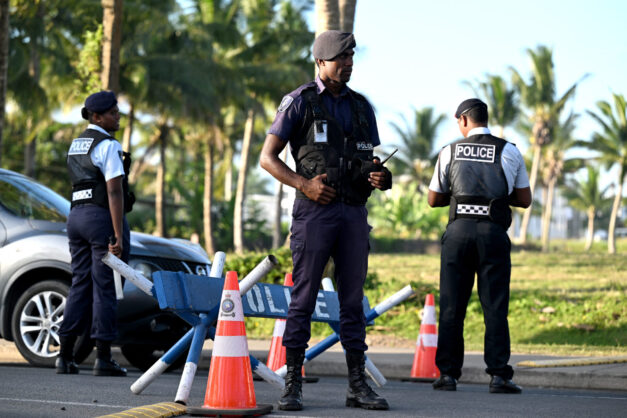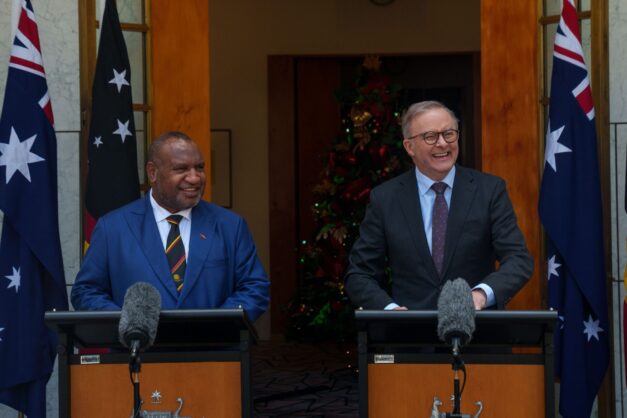Plural Policing in the Pacific Islands

Police officers stand guard at a security checkpoint in Fiji’s capital, Suva, on 19 December 2022. Photo: Saeed Khan / AFP
Can the plural qualities of Pacific Islands policing be harnessed to produce better security outcomes for all?
While we commonly think of it as the domain of professional police officers, a broader conception of policing reveals a more complex and plural reality. If we take policing to include order maintenance, peacekeeping, rule & law enforcement, and investigating and preventing crime, it’s clear that multiple actors can be involved in such activities. These can include public, private and community-based actors and can take place across different scales from the most local to the transnational. Scholars use the term plural policing to denote the multiplicity of providers and diverse institutional arrangements involved in policing work in various contexts. An important research focus has been on interactions between different policing forms and their practical outcomes in terms of enhancing or undermining safety and security.
Interest in plural policing in countries like Australia and New Zealand has been largely driven by the growth of private security, with private operators offering many similar services to those associated with public police. The Pacific Islands region is home to an extensive array of policing forms and practices. As well as improving our understanding of how policing actually works in different Pacific settings, acknowledging its plural character can potentially assist domestic and international decision-makers in their efforts to improve the quality and effectiveness of policing services.
Considerable variation exists between police organisations and their operating environments across the region. Their sizes range from 100 officers in tiny Tuvalu to around 7,000 in PNG. While distinct legacies of colonial policing remain in some places, modern service-oriented models have been adopted in others. Other variations include geographical and topographical factors affecting police mobility and coverage; professional competencies; and differences in the type and incidence of crime, violence and social disorder. Commonalities include the usually modest public resources available to such organisations and their technical competencies for meeting newer kinds of criminal threats, such as organised and transnational crime, cybercrime, and complex financial frauds.
Transnational policing involving assistance from international partners is an important dimension of plural policing in the region. This has included many years of capacity-building support, typically training and advisory inputs, provided by countries like Australia, New Zealand and the United States to Pacific police organisations. External police have also been deployed periodically in an executive policing capacity, as in the Regional Assistance Mission to Solomon Islands (RAMSI) and the short-lived Enhanced Cooperation Programme (ECP) in PNG. Growing concerns in recent years around transnational and other emergent threats have led to a flurry of transnational policing activities involving police and other regulatory agencies, with international partners providing technical expertise and other resources. For example, there are now 28 transnational crime units (TCUs), making up the Pacific Transnational Crime Network (PTCN), spread across Pacific Island states and territories.
The private security industry has also acquired a prominent and growing presence in larger countries, adding another layer of policing provision. Companies range from small, locally-owned enterprises with a handful of employees to major multinational companies with global reach. Services include static and mobile protection, close personal protection, security training and assessments, rapid response capabilities, and the supply and monitoring of sophisticated surveillance and tracking systems. The industry has become ubiquitous in PNG, the region’s largest and most populous country, reflecting growing demand from corporate clients in the face of high levels of insecurity and the shortcomings of that country’s public police.
Most Pacific Islanders continue to rely on extended families, kinship associations, community leaders and other local mechanisms for their everyday policing needs. Diverse local policing forms are found across the region, often involving chiefs or other community leaders fulfilling a policing role. These are usually the first port of call in the case of minor disputes and safety issues in rural locations, as well as in many urban settlements, where public police may be difficult to access or where local approaches are preferred. Community norms applied in these settings are likely to draw on a mix of kastom, state law and Christianity.
Each kind of policing has strengths and weaknesses. Thus, while local forms are easily accessible, they can also be disempowering and oppressive to some groups. Likewise, while some private operators offer high-quality policing services, these are only available to those that pay. At the same time, it is important to see the existing connections and scope for productive synergies between different policing forms in these larger security networks. Focusing on connectivity, rather than separation, helps us consider how strengths in some areas can compensate for weaknesses in others, and how the plural qualities of Pacific Islands policing might be harnessed to produce better security outcomes for all.
Plural policing is one of the themes explored in the recently published book, Policing in the Pacific Islands.
Associate Professor Sinclair Dinnen
More Stories

Security Snapshot - 28 Mar 2024
Pacific Security Snapshot | 28 March 2024
Summary ➣ Heavy rains, floods, landslides and earthquakes batter the region ➣ Pacific submissions to the International Court of Justice (ICJ) on climate change responsibility ➣ Elections across the Pacific prompting changes to diplomatic relations and security arrangements ➣ Challenges for women in politics Climate Security Lives have been lost in PNG after a series…

Blog - 11 Dec 2023
A PNG-Australia security framework: not a treaty but solid nonetheless
Papua New Guinea PM James Marape and Australian PM Anthony Albanese face the media after signing a historical Bilateral Security Agreement on 7 December in Canberra. Credit: PM Albanese Facebook On 7 December 2023, the prime ministers of Australia and Papua New Guinea signed an historic security agreement in Canberra. It has taken approximately…






